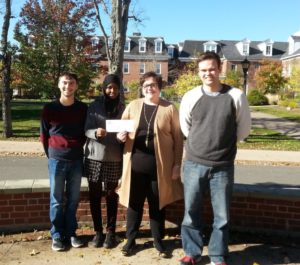This article, written by StFXAUT Communications Officer Philip Girvan, appeared in the Winter 2018 edition of The Beacon.

photo credit: Susan MacKay
The World University Service of Canada (WUSC) is, according to their website, a non-profit organization dedicated to providing education, employment, and empowerment opportunities for youth around the world”. WUSC has local committees across Canada including the StFX WUSC Society.
The StFX WUSC Society’s Facebook page explains that:
[t]he Student Refugee Program is a sponsorship program through which support is given to a student registered by the United Nations as a refugee to pursue post-secondary studies in Canada. For twelve consecutive years, StFX has admitted one student each year to the sponsorship program. The students that have been welcomed to StFX represent displacement due to civil war, persecution and genocide in regions such as Sudan, Rwanda, the DRC, and Ethiopia.
One of the WUSC priorities identified on their website is “[e]nsuring that youth have access to quality education”. This past fall the StFXAUT contributed $4,573 to the StFX WUSC Society to assist with this goal. StFXAUT funds will cover a second year refugee student’s meal plan fees. The Beacon had the opportunity last fall to speak with StFX WUSC Society President Isaak MacMullin and Vice President Jordan MacDonald to learn more about the committee and the work that they do on campus.
StFX University covers tuition, residence, and meal plan fees for the student’s first academic year. Money raised by the StFX WUSC Society pays airfare, immigration fees, and costs associated with living on-campus during the summer. MacMullin noted that students receive “a little bit of money in their second, third, and fourth year, but mainly we cover first year”. MacDonald emphasized that there are “no extra payments [for refugee students] other than what you can receive through regular student loans and grants”. The bulk of the funding comes from a $4 levy that is part of the student union fee.
The StFX WUSC Society also helps the student access a Nova Scotia Health Card (MSI), select a mobile account, purchase a laptop or other internet device, and get them to their first classes. Part of their role is to, as MacMullin put it, “get them comfortable with how things work at StFX”.
Selecting a student likely to thrive at StFX is a priority. Once the StFX WUSC Society submits an Intent to Sponsor with WUSC, they receive a brochure of eligible applicants. This includes a photograph, an origin story, test scores, and a description of academic interests. MacDonald said that this information gives the StFX WUSC Society a better idea of “what they’re interested in doing [and if] the programs they are looking for are available here”. MacDonald provided the example of “someone interested in art and design [and how it was] not fair for us to take this person on and then force them into a BA when they really would have liked a BFA”.
StFX WUSC Society also communicates desired characteristics and qualities of students to WUSC. At one point, they were receiving only male applicants. Wanting to support female students, the StFX WUSC Society requested to receive female applicants. The portfolios of applicants deemed as not necessarily a great fit for StFX are circulated among other universities. MacMullin noted, “if we don’t pick someone, it doesn’t mean that they’re never going to get a chance”.
MacMullin admitted that the StFX WUSC Society is “kind of a program that flies under the radar a little bit”. Recent promotional activities including what MacMullin described as “a thank you drive earlier this year where we gave a free coffee and cookies and said thank you for giving $4 because most students don’t know that they give $4 to this program” have helped, there is a recognized need to raise the group’s profile. The group has been in touch with Syria-Antigonish Families Embrace [SAFE] for ideas on how to better do that. Still, as MacDonald said, “people are starting to recognize it a little bit. People are starting to recognize the WUSC shirts”.
